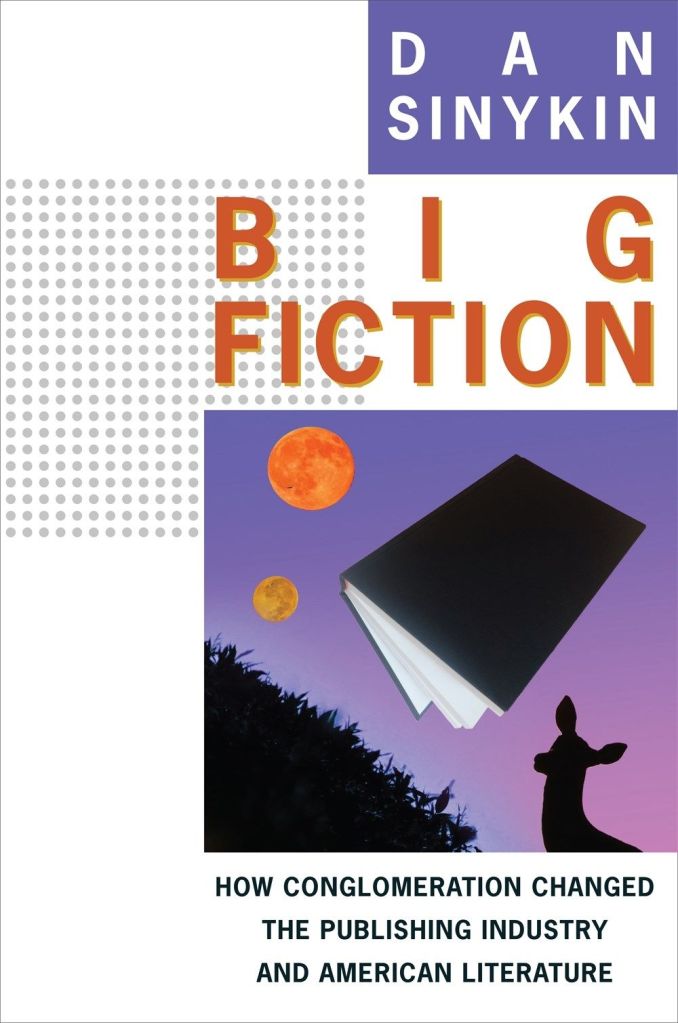
227 pages.
First published Oct 24, 2023 (Columbia University Press).
Non-fiction.
You know that meme with the person working out complex formulas on a glass screen before them? Or the older TV trope of a wall of pictures and newspaper clippings joined by a web of red thread? I felt like that a lot while reading this book. There is a veritable torrent of information—names, characters, publishers, writers, editors—all connected to each other with red webbing. I decided eventually to just read, and not try to put it all together, and was much happier when I did. And maybe that’s the point of the book, which reviews the arc from around 1960 to the present during which conglomeration accelerated in American publishing: the history of US publishing is a complex web that needs dedicated study to make sense of it.
There are a lot of takeaways. I understood, finally, the origin and raison d’etre of some of my favourite publishers: Graywolf Press, Deep Vellum and Dalkey Archive Press, Coffee House Press, and even W. W. Norton. And why some of the best writing (and writing in English translation) comes from there. I finally made sense of what is an often bewildering layer cake of imprints at the big publishing houses (:conglomeration). I was able to see why and how US publishing remained white and male for so long, and then the place in it of Black giants like Toni Morrison and Percival Everett, and Asian American ones like Maxine Hong Kingston. Also the rise and success of genre authors like Stephen King, Danielle Steel, Grisham, Clancy, Crichton, Koontz. Big Fiction also manages to make a little sense of the NYT bestseller lists for me—why they exist, and why I can never agree with them.
As a work of literary history, Big Fiction truly succeeds. Not only does it chart the rise and rise of conglomeration, but along the way, it also introduces readers to a vast cast of characters in US publishing. It details the rise of agents and the changes in power dynamics between them and editors; the rise of the non-profit publishers in opposition to the big commercial houses (my favourite part, and a fascinating section; I gained a lot of knowledge on this); sexism and racism in US publishing, and the path-making people who came first—including the astounding early women; the impact of literary prizes on what gets published, and when; and Big Fiction even touches upon the beefs between great authors like Percival Everett and Alice Walker, and Frank Chin vs. Maxine Hong Kingston (I know which side I take on both by the way). However, this is not always an accessible read for the casual reader; some of the generous amount of detail is best suited to people studying literature and the publishing industry.
Because the author’s main topic is conglomeration, he doesn’t deal with the small presses of the 1960s and ‘70s (many Black, many female-led, etc) that fell by the wayside in the economic turmoil of the 1970s. (He mentions Kitchen Table: Women of Color Press in passing.) There’s quite a lot about Everett and Morrison, and their struggles in publishing; also the impact of those non-profit publishers mentioned above on making the publishing scene (on the author’s side, anyway) much less white, and much more international. It’s also really interesting to read detail about the ups and downs of Random House, and why it looks the way it does today. Also W. W. Norton, as the one that stands apart. The contrast between the early years of publishing—when characters like Jason Epstein stood out; he treated women in really nasty ways—and the present, where a book on the market has come about through the work of many teams and departments, is the thing that Big Fiction makes clear is a result of conglomeration. Sinykin leaves it to the reader to decide if that’s good for authors, or not.
US publishing is the behemoth that shapes reading tastes worldwide. I am very glad to have read this, as a lover of literature, and one who did not really understand before how US publishing works. Many thanks to Columbia University Press and to Edelweiss for access to a DRC.
—
Side note: For more about the impact of US publishing on what the rest of the world reads, check out this article: Vermeulen, P., & Hurkens, A. (2019). The Americanization of World Literature? American Independent Publishing and the World Literary Vernacular. Interventions, 22(3), 433–450.
Support independent bookshops and my writing by ordering it from Bookshop here.

Leave a comment